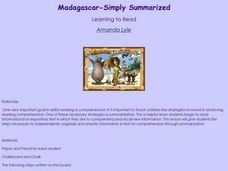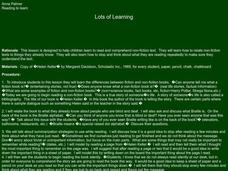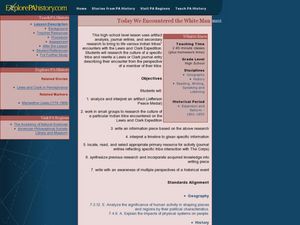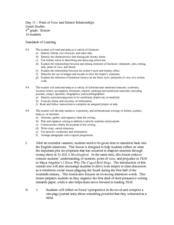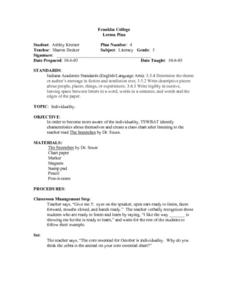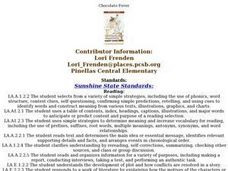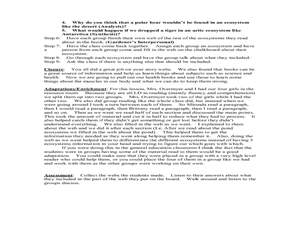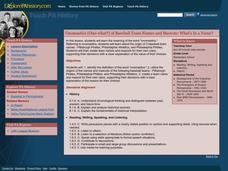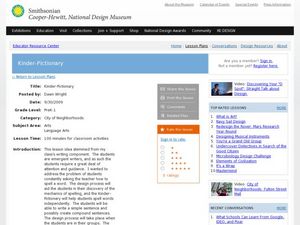Curated OER
Prereading
Fourth graders participate in think-pair-share reading strategy in this lesson. They identify their purpose for reading as well as purposes for reading fiction/nonfiction. They list and discuss several prereading activities, and then...
Curated OER
Chunks, Chunks, And More Chunks!
Pupils summarize a selected piece of text nonfiction text. After reviewing the process for summarizing, students read a nonfiction article, highlighting important information as they read. They write a summary paragraph using the five...
Curated OER
Madagascar-Simply Summarized
Learners summarize a selected piece of text nonfiction text. After reviewing the correct way to read silently, students read a nonfiction article. They write a summary paragraph using the four step process outlined by the instructor. ...
Curated OER
Short and Sweet
Students summarize nonfiction text. After reviewing the process for reading in order to summarize, students independently read a nonfiction article. They write a summary paragraph using the checklist outlined by the instructor during...
Curated OER
Reading to Learn
Children learn to read and comprehend non-fiction text and explore how to relate non-fiction texts to things they already know. They then examine how to stop and think about what they are reading repeatedly to make sure they understand...
Curated OER
Parts of Speech: Active Verbs
Pupils use White Fang to help them study active verbs. In this grammar lesson, students define active verbs and find examples in the the novel White Fang. Pupils then use ProQuest to research a place they'd like to visit. Students write...
Curated OER
The Long and Short of It: Summarizing Important Details
Students practice their summarizing skills while listening to a brief biography of Amelia Earhart. Students take notes while the teacher reads the article and write a paragraph that summarizes the important events from Amelia Earhart's...
Curated OER
Literal Meaning of Reading
Students practice basic reading skills. In this reading lesson plan, students review the letter M, read the story If You Give a Mouse a Muffin. Students will then write a book using their name, for example: If You Give a Taco to Tracy.
Curated OER
Literal Meaning of Reading
Students demonstrate literal meaning of a fiction book. In this reading comprehension lesson, students listen to the book, If You Give a Mouse a Muffin and practice the "m" sound during the read aloud. Students answer questions about the...
Curated OER
Levittown, White Picket Paradise?
Pupils study the origins and happenings of Levittown, Pennsylvania. For this Pennsylvania history lesson plan, students use primary and secondary sources to research the beginnings of Levittown, PA. As a culminating activity, pupils...
Curated OER
Today We Encountered the White Man
Students analyze and interpret artifacts and a timeline to get specific information. In this timeline lesson plan students work in groups to research an Indian tribe and write an information piece of their research.
Curated OER
Point of View and Mentor Relationships
Tenth graders analyze the role of mentors, point of view, and prejudice using the texts of To Kill a Mockingbird and Maya Angelou's I Know Why the Caged Bird Sings. For this literature analysis lesson, 10th graders review Scout's...
Curated OER
Other Faces of Discrimination
High schoolers explore the bullying experienced by those who graduated from one-room school houses to large high schools. In this discrimination lesson, students read the 2 provided handouts on the topic and then complete the included...
Curated OER
Language Arts: What Makes an Individual
Third graders listen to the teacher read "The Sneetches" prior to creating charts about their individual characteristics. After numerous examples of individuality, they compile them on chart paper. As an extension, 3rd graders write...
Curated OER
Baseball Cards
Learners read a short story on baseball cards and reflect on Honus Wagner's decision to withdraw his card. In this baseball cards lesson plan, students study how children used cards in the 1930's and express their understanding of Honus...
Curated OER
Interesting Idioms
Students are introduced to the topic of idioms in figurative speech. Using the definition of idioms, they use literature to view examples. They identify idioms in different forms of writing and practice using them in speech. ESL...
Curated OER
Chocolate Fever
Fourth graders read and interpret each chapter of the book in small groups through various exercises. Vocabulary lists are given, as well as rubrics, quizzes and activity sheets. Students create their own PowerPoint presentations to...
National First Ladies' Library
Vegas and the Mob
Students identify with and interpret the role of organized crime in the development of one of America's most vibrant cities. Then they look into the city's establishment and development, follow the role of organized crime in its...
Curated OER
The Life and Times of Tomie dePaola
First graders research information about the author Tomie dePaola. In this author studies lesson, 1st graders use the computer to find information about Tomie dePaola's life and writing accomplishments. Students create booklet about the...
Curated OER
Graphic Organizers Aid Comprehension
Students create story webs to aid comprehension of ecosystems. In this reading strategies lesson plan, students discover the importance of organizing information while reading a nonfiction text. Students produce story webs to communicate...
Curated OER
Comparing Characters Across Two Short Stories
Ninth graders listen to a read aloud of two short stories focusing on literary devices. The write about the settings and realism of the stories, and decide each main character handles the conflict he faces with nature.
Curated OER
Celebrations
Second graders answer questions after listening to the the story "Celebrating Life Around the World" and verbally identify three ways in which people celebrate special occasions. They then make two verbal connections from their own...
Curated OER
What's In a Name?
Young scholars explore onomastics. In this baseball history activity, students create their own team name and explain the name they chose. After choosing a team name young scholars support their choice with revelant reasons and be able...
Curated OER
Kinder-Pictionary
Students create their own dictionary. In this spelling lesson plan, students make a dictionary with just words and pictures. They use these dictionaries when they are writing to remember how to spell words.


